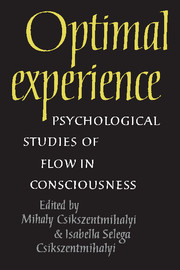Book contents
- Frontmatter
- Contents
- Acknowledgments
- Contributors
- I A THEORETICAL MODEL OF OPTIMAL EXPERIENCE
- II VARIETIES OF THE FLOW EXPERIENCE
- III FLOW AS A WAY OF LIFE
- IV THE MEASUREMENT OF FLOW IN EVERYDAY LIFE
- 15 Introduction to Part IV
- 16 The systematic assessment of flow in daily experience
- 17 The quality of experience in the flow channels: comparison of Italian and U.S. students
- 18 Flow and the quality of experience during work and leisure
- 19 Optimal experience and the uses of talent
- 20 Self-esteem and optimal experience
- 21 Optimal experience and the family context
- 22 The future of flow
- References
- Name index
- Subject index
21 - Optimal experience and the family context
Published online by Cambridge University Press: 05 June 2012
- Frontmatter
- Contents
- Acknowledgments
- Contributors
- I A THEORETICAL MODEL OF OPTIMAL EXPERIENCE
- II VARIETIES OF THE FLOW EXPERIENCE
- III FLOW AS A WAY OF LIFE
- IV THE MEASUREMENT OF FLOW IN EVERYDAY LIFE
- 15 Introduction to Part IV
- 16 The systematic assessment of flow in daily experience
- 17 The quality of experience in the flow channels: comparison of Italian and U.S. students
- 18 Flow and the quality of experience during work and leisure
- 19 Optimal experience and the uses of talent
- 20 Self-esteem and optimal experience
- 21 Optimal experience and the family context
- 22 The future of flow
- References
- Name index
- Subject index
Summary
Many studies have attempted to understand the influence of the family by observing its impact on a child's behavior; they have left – hidden from view – the subjective experience of the child. Although valuable insights have been gained through behavioral observations, the present study adopts the Experience Sampling Method (Csikszentmihalyi, Larson, & Prescott 1977) to begin filling in this subjective aspect of our understanding of the family. There has been a convergence of thought in several disciplines around the simple idea that a person's subjective interpretation of a situation will influence subsequent behavior. Paradigm shifts in philosophy (Langer 1957), the social sciences (Taylor 1979), and developmental thought about children and families (Maccoby 1980) have stressed individuals' active role in defining their environment. Thus to understand the influence of the family context, it is important to know how it affects the way children subjectively interpret their current situations.
The flow model (Csikszentmihalyi 1975b) focuses on one kind of interpretation of a situation – the ability to find in it opportunities for meaningful action or challenge – which leads to the optimal experience of flow and appears to have many healthy and beneficial consequences, including a path for differentiation and growth (Csikszentmihalyi 1982a). How might a family foster this form of interpretation – or way of paying attention – in its children?
- Type
- Chapter
- Information
- Optimal ExperiencePsychological Studies of Flow in Consciousness, pp. 342 - 363Publisher: Cambridge University PressPrint publication year: 1988
- 24
- Cited by



